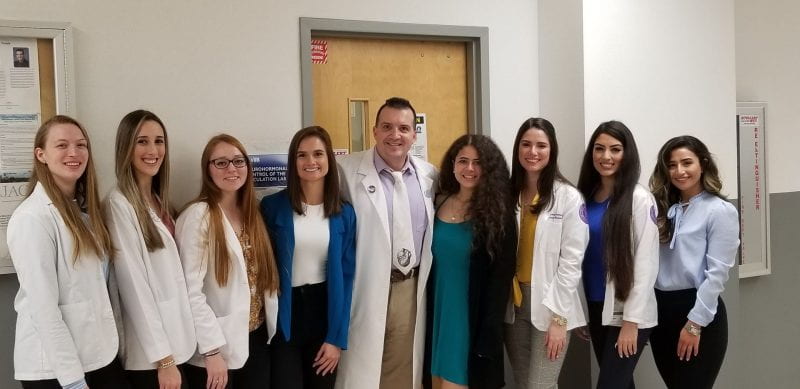College of Pharmacy and Halmos College Faculty Collaborate in Journal Article

 During April, College of Pharmacy faculty member Anastasios (Tassos) Lymperopoulos, Ph.D., F.A.H.A., F.E.S.C., and his research team discovered that a protein called GRK5, which phosphorylates other proteins (a kinase), blocks the receptor of a hormone that is very toxic for the heart, named aldosterone. Halmos Chemistry faculty member Beatrix Aukszi, Ph.D. is a longtime collaborator of Dr. Lymperopoulos and a contributor to his research.
During April, College of Pharmacy faculty member Anastasios (Tassos) Lymperopoulos, Ph.D., F.A.H.A., F.E.S.C., and his research team discovered that a protein called GRK5, which phosphorylates other proteins (a kinase), blocks the receptor of a hormone that is very toxic for the heart, named aldosterone. Halmos Chemistry faculty member Beatrix Aukszi, Ph.D. is a longtime collaborator of Dr. Lymperopoulos and a contributor to his research.
Their research was published in the International Journal of Molecular Sciences and is entitled, “Antagonistic Roles of GRK2 and GRK5 in Cardiac Aldosterone Signaling Reveal GRK5-Mediated Cardioprotection via Mineralocorticoid Receptor Inhibition”.
Aldosterone is increased during heart failure, after a heart attack, in hypertension, and in other cardiovascular diseases. It increases the reabsorption of sodium and water into the kidneys, causing high blood volume and blood pressure. It also has several direct damaging effects on the heart, such as fibrosis, hypertrophy, and inflammation. This is why drugs that block its receptor, called mineralocorticoid receptor antagonists (MRAs), are part of the cornerstone pharmacotherapy of chronic heart failure in humans. By finding a way to stimulate GRK5 in the heart, for example with certain drugs that activate a receptor for adrenaline, professor Lymperopoulos hopes it will lead to the reduction of the severity of heart failure. The group is now testing new and existing heart failure medications such as Inspra, Finerenone, and Aldactone, to see how effective they are at promoting this cardio-protective GRK5 action against aldosterone.
This study was supported in part by a Gateway to Research scholarship from the American Foundation for Pharmaceutical Education (AFPE), by a Scientist Development Grant from the American Heart Association (AHA #09SDG2010138), and by a Nova Southeastern University’s President‘s Faculty Research & Development Grant.
